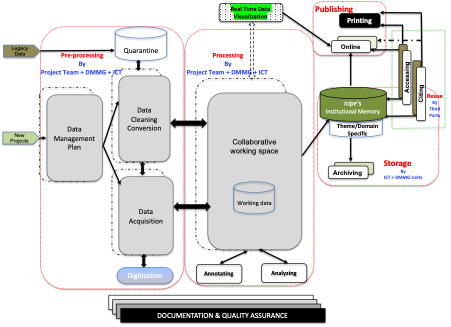Goal and Broader Objectives
The goal of the DMMG Unit is to manage all datasets generated from the icipe 4H themes’ research activities, empower research technicians, scientists, students and partners with cutting-edge analytical skills, and strengthen the internal human resource capacity of icipe’s research community to enhance resource mobilisation.
Specifically, the Unit works under the following objectives:
- To enhance research data management and sharing in compliance with internationational standards
- To strengthen the analytical skills of research technicians, scientists, students and partners.
- To develop a research niche for the DMMG Unit and enhance resource mobilisation.
- To contribute to the full implementation of icipe’s integrated ‘One Health’ paradigm.
Overview of Activities
The DMMG Unit’s primary activity is to establish and manage an institutional Data Management (DM) workflow that will handle all types of research data, including the observational, experimental, simulation, and derived data.
- icipe’s observational data are collected through open-ended survey, observation and the use of equipment and devices to monitor and record information.
- Experimental data are obtained through functional involvement by the data collector to create and gauge the change, and to establish causal relationship.
- Simulation data are obtained through mimicking known processes and applying computer techniques to produce desired results, while derived data are the result of the application of formulae to transform observed information.
The data management provides a collaborative framework with cooperation between project teams, the DMMG and the Information Communication Technology (ICT) units. The workflow comprises five phases, starting with pre-processing. This focuses on the design of a data management plan, followed by the development of templates and digital tools for data acquisition, cleaning and conversion. In the processing phase, data are processed, annotated and analysed in a collaborative workspace by the project team, DMMG and ICT units. Within this phase, analytics are applied to the data to capture, map, and visualize icipe’s work using graphs and numbers. In the third and fourth phases, the data are then published and stored, ready for reuse by third parties in the final phase. All these joint activities are guided and regulated by icipe’s data management and ICT policies.

The second set of activities of the DMMG Unit involve conducting high level R4D and trainings in bioinformatics, biostatistics, geographical information system (GIS) and modelling.
- Bioinformatics supports genomic research data management and planning conducts training on genomic data analysis, data storage and workflows to facilitate reproducible and collaborative genomics research, all aimed at optimizing the research output from the data.
- The biostatistics provides research support through training (face to face statistics courses & internship), quality assurance of research processes and outputs namely, proposals and protocols, research data collection, analysis and interpretation of results, manuscripts for publication, book chapters and manuals.
- Modelling activities include the application of advanced mathematical, physical and statistical methods to data on pests/diseases in animals, ecosystems, plants, and humans. Emphasis is placed on research activities aimed at developing, applying and exploring new computational techniques for decision support in the context of agricultural systems, disease vectors control, environmental assessment, integrated pest management (IPM) implementation practices and interventions, and climate change and variability impact assessments. Forward-thinking, system design, system thinking and system dynamics techniques, including nonlinearities with feedback loops within landscape lens are used to make informed decisions.
- The unit uses earth observation (EO), remote sensing, spatial analytics and geo-information tools to provide spatial analysis and mapping services to icipe’s research themes and programs.
Strategic Outlook (2021–2025)
The DMMG will work towards ensuring the availability and accessibility of icipe research data at all times. The DMMG will create and provide reference materials to icipe’s data management that integrates features for auditing the team players to ensure that good practice. The main focus is to rely on what is important and impactful towards restoring and establishing the institution memory. We will establish mechanism for continuing raising awareness of good practices and support self-assessment, provide suggestions on adaptation and adoption of new technologies and infrastructure for better research data management and control. To be precise, the DMMG team will advance the use of ‘big data’ and cloud-based cross-cutting processing technologies that allow harmonized storage and analysis of petabytes of various data types that are collated on a routine basis. In the context of research, the unit will use advanced methods and analytics including machine learning (ML), artificial intelligence (AI), design thinking, system thinking and system dynamics and computer vision algorithms to exploit and interpret ‘big data’ to develop geospatial cloud-based tools and mobile apps that can be operationally utilized for ‘real-time’ insect, plant and environmental health indicators surveillance, monitoring and forecasting. Moreover, the unit team will assess the use of hyper-spatial unmanned aerial vehicles and satellite-based high definition videos and altimetric information that can improve the understanding of various plant, animal, human and environmental health issues.
Key Ongoing projects
- Scaling-up Climate-Smart Pest Management Approaches for Enhanced Maize and Tomato Systems Productivity in Eastern Africa (SCLAMP-EA)
- Modelling crop yield loss to insect pests in warming climate
- Harnessing data science to estimate the risk factors for the impacts of COVID-19 on health, welfare and food system in East African countries
For further information, click here or contact:
Henri Tonnang (htonnang@icipe.org), Head, Data Management, Modelling, and Geo-Information (DMMG) Unit

